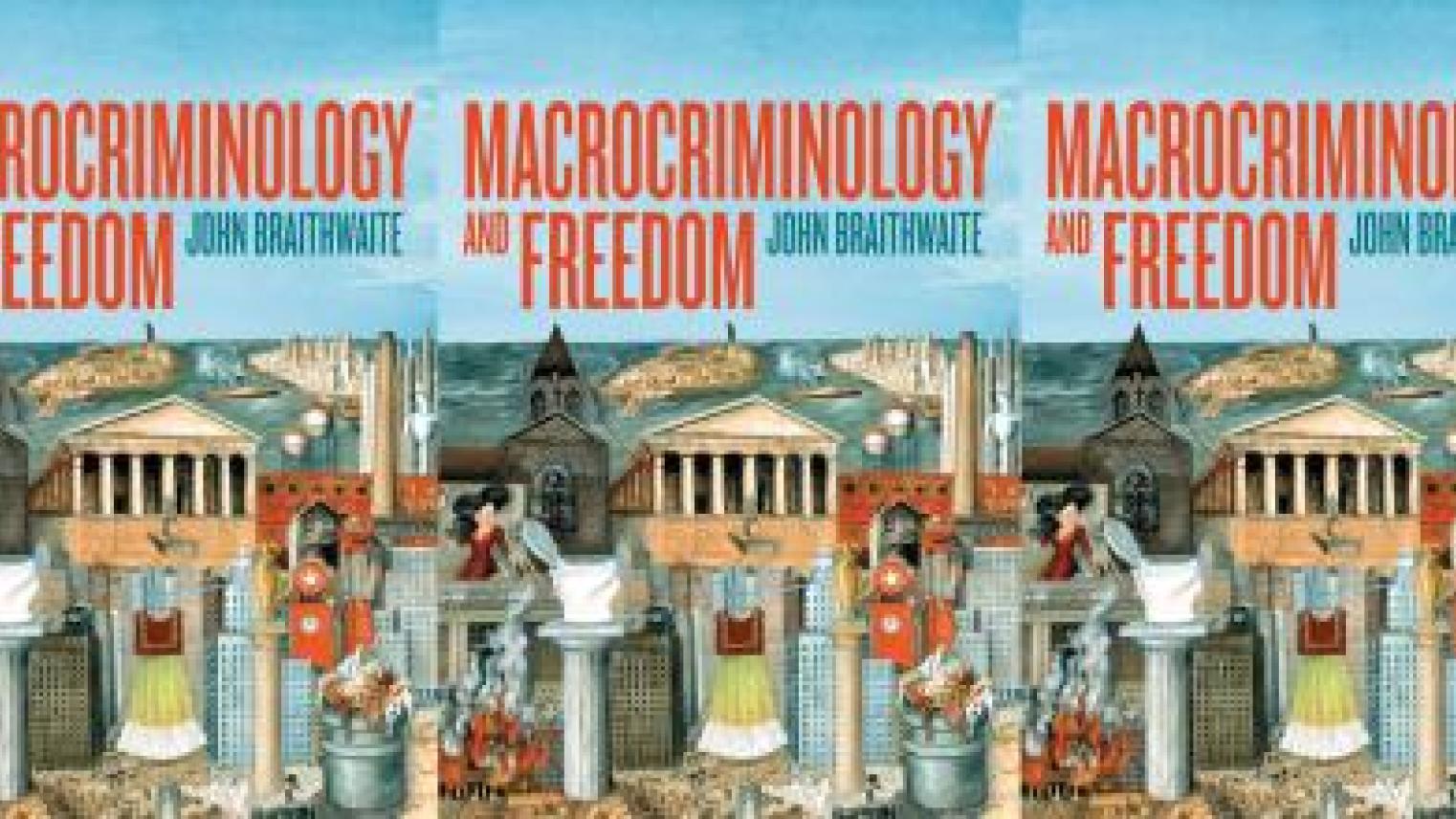The School of Regulation and Global Governance warmly invites you to the launch of John Braithwaite’s new book, Macrocriminology and Freedom.
Join us for a panel discussion to mark the release of Macrocriminology and Freedom (ANU Press, February 2022). The event will be opened by Kate Henne, Director, ANU School of Regulation and Global Governance (RegNet) and will feature comments by John Braithwaite, Susanne Karstedt, Jensen Sass, Meredith Rossner and Anthea Roberts.
UPDATE: The in-person book launch will now be held online via Zoom. We sincerely apologise for any inconvenience.
About the book
How can power over others be transformed to ‘power with’? It is possible to transform many institutions to build societies with less predation and more freedom. These stretch from families and institutions of gender to the United Nations. Some societies, times and places have crime rates a hundred times higher than others. Some police forces kill at a hundred times the rate of others. Some criminal corporations kill thousands more than others. Micro variables fail to explain these patterns. Prevention principles for that challenge are macrocriminological.
Freedom is conceived in a republican way as non-domination. Tempering domination prevents crime; crime prevention reduces domination. Many believe a high crime rate is a price of freedom. Not Braithwaite. His principles of crime control are to build freedom, temper power, lift people from poverty and reduce all forms of domination. Freedom requires a more just normative order. It requires cascading of peace by social movements for non-violence and non-domination. Periods of war, domination and anomie cascade with long lags to elevated crime, violence, inter-generational self-violence and ecocide. Cybercrime today poses risks of anomic nuclear wars.
Braithwaite’s proposals refine some of criminology’s central theories and sharpen their relevance to all varieties of freedom. They can be reduced to one sentence. Strengthen freedom to prevent crime, prevent crime to strengthen freedom. More about the book
About the speakers
John Braithwaite is an Emeritus Professor and Founder of RegNet (the Regulatory Institutions Network), now School of Regulation and Global Governance (RegNet) at the Australian National University. John is best known for his work on restorative justice, responsive regulation and the globalization of regulation. He has been active in social movement politics for 50 years in Australia and internationally. In the past he has worked on a variety of areas of business regulation and on the crime problem. He now leads a 25-year comparative project called ‘Peacebuilding Compared’.
Kate Henne is the Director of RegNet and leads the School’s Justice and Technoscience Lab. She is also an Adjunct Professor at Arizona State University (USA) and University of Waterloo (Canada). An interdisciplinarily trained scholar, she has a PhD in Criminology, Law and Society with a specialisation in Anthropologies of Medicine, Science and Technology from the University of California, Irvine. Before commencing as RegNet’s Director, she held the Canada Research Chair in Biogovernance, Law and Society at the University of Waterloo, where she was also a Fellow of the Balsillie School of International Affairs. Kate’s research is concerned with the interface between inequality, technoscience and regulation.
Susanne Karstedt is a Professor in the School of Criminology and Criminal Justice at Griffith University since 2015. Before she joined the School, she held Chairs in Criminology at Keele University and the University of Leeds, UK. She trained as a sociologist at the University of Hamburg, and already during her studies discovered criminology. Her research has a strong focus on cross-national and cross-cultural comparisons of both crime and justice. A particular interest of Susanne is the exploration into the ways how democracy, its values and institutions shape violence, corruption, state crime, imprisonment and prison conditions. Other important areas of her research are mass atrocities and transitional justice.
Jensen Sass is a Braithwaite Fellow in the School of Regulation and Global Governance (RegNet) and was previously ARC Laureate Postdoctoral Fellow at the Centre for Deliberative Democracy and Global Governance at the University of Canberra. He completed his PhD at Yale University where his research was supported by the Tobin Project and the American Council of Learned Societies. Jensen works at the intersection of normative political theory and the empirical study of corporations, technology, and the public sphere. His research spans two substantive fields within political science and sociology.
Meredith Rossner is Professor of Criminology and Deputy Director of the Centre for Social Research & Methods at the ANU. She holds a PhD in Sociology and Criminology from the University of Pennsylvania and was previously Associate Professor of Criminology at the London School of Economics and Political Science. Her research focuses on the role of emotions, rituals, the built environment, and technology in justice practices. This includes work on the emotional dynamics of restorative justice, micro-level dynamics of court procedure and jury deliberation, the role of courtroom design on access to justice and the use of video technology in courts.
Anthea Roberts, a Professor at the School of Regulation and Global Governance (RegNet), is an interdisciplinary researcher and legal scholar who focuses on new ways of thinking about complex and evolving global fields. Her research areas include international law, trade and investment, the effect of geopolitical change on global governance, and understanding and navigating complex systems. Anthea is the Director of the Centre for International Governance and Justice and chairs the ANU Working Group on Geoeconomics. She formerly taught at the London School of Economics, Columbia Law School and Harvard Law School.
